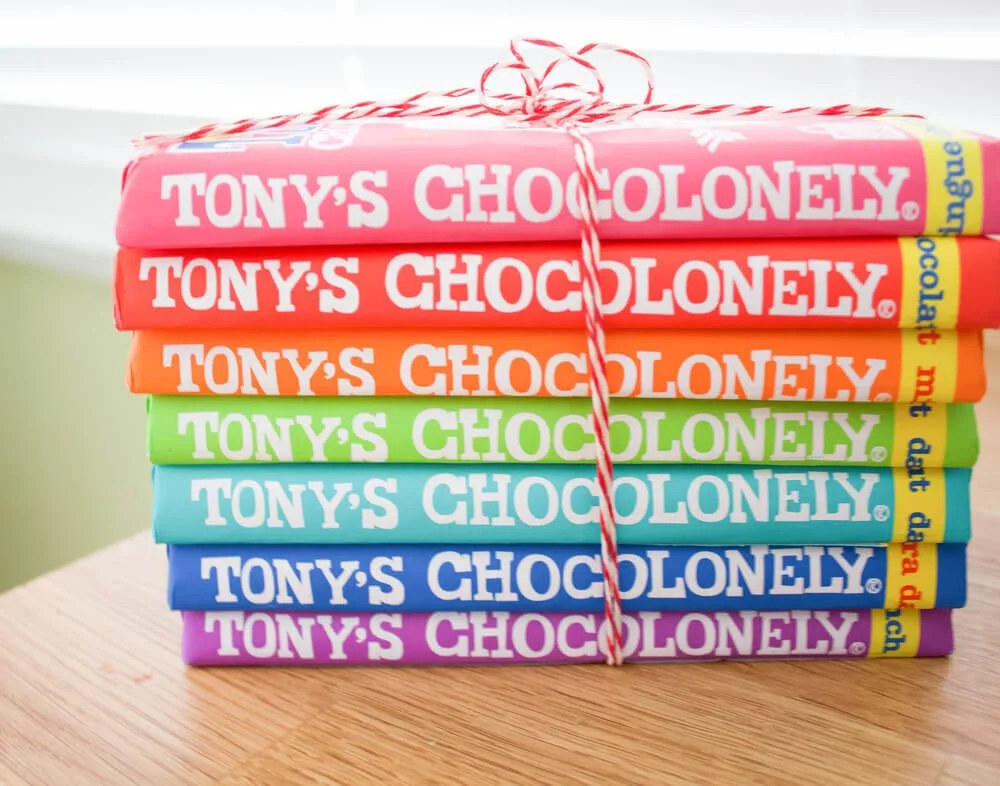The 7 Best Fair Trade Chocolate Brands
Chocolate is a sweet treat enjoyed in America on holidays like Valentine's Day and as an everyday snack!
However, it's important to recognize that not all chocolate is created equally.
This guide will start with a quick over view of the importance of fair trade chocolate, a list of fair trade chocolate brands to try, then explore slavery in the chocolate industry, and third party certifications.
Pin this fair trade chocolate guide for later!
Don’t worry I’ve tried chocolate from all of these ethical chocolate brands and chocoholics everywhere will be thrilled with these slave free chocolate brands that are using fair trade practices.
Also, I swear fair trade chocolate tastes WAY better than those popular brands you find in the candy isle due to the care and considerations for high quality ingredients, people, and the planet.
This post does contain some affiliate links. If you decide to make a purchase The Honest Consumer will receive a commission. Our commission is at no additional cost to you.
Why is fair trade chocolate important?
Unfortunately the cocoa industry is known for slavery and unethical treatment of workers. But thankfully with fair trade chocolate we can give treats that are made with love and kindness.
Here are a few reasons buying chocolate made with fair trade practices matters.
Lack of Transparency in the Cocoa Industry
There is a huge lack of transparency with in the cocoa farming industry. With big name brands not knowing where their ingredients are coming from, this creates low standards and does not hold farms (or supply chains) accountable for treatment or payment of workers.
The Washington Post reports, “Nearly 20 years after pledging to eradicate child labor, chocolate companies still cannot identify the farms where all their cocoa comes from, let alone whether child labor was used in producing it.
Mars, maker of M&M’s and Milky Way, can trace only 24 percent of its cocoa back to farms; Hershey, the maker of Kisses and Reese’s, less than half; Nestlé can trace 49 percent of its global cocoa supply to farms.”
Fighting for the Farmers
Due to the lack of transparency this leads to a lot of unethical treatment of cocoa farm workers including slavery and child labor. By choosing to purchase fair trade chocolate you’re ensuring the farmers are paid and treated fairly through out the supply chain.
By paying farmers fairly and reinvesting in communities this encourages farmers to support their families and lift themselves out of poverty.
7 Slave Free & Fair Trade Chocolate Brands to Love
If you're ready for a sweet treat these are some of the best fair trade chocolate brands to try! All of these brands value social responsibility, sustainable practices, and use fair trade ingredients.
THEO CHOCOLATE's Fair Trade Organic Bean to Bar Chocolate
Theo Chocolate is based in Seattle WA and I’ve had the joy of touring their factory a few times.
Theo Chocolate is an organic, fair trade bean to bar company which means they are able to fully monitor the ethics of the their supply chain because their process starts with the cocoa bean whereas other company start with chocolate liquor.
Theo Chocolate is Fair for Life and USDA organic certified. On top of having amazing chocolate bars, this brand also carries yummy truffles, baking chocolate, chocolate peanut butter cups, candy, and more.
This fair trade, organic chocolate brand is definitely worth trying out! I’m personally a huge fan of the Raspberry Chocolate bar and Cherry Almond!
Theo chocolate can easily be found at popular grocery stores across the U.S. including Kroger, QFC, & Whole Foods. Their chocolate can also be purchased online. Theo Chocolate ranges from $2 candies to bundles sold at around $30.
TONY’S CHOCOLONELY Slave Free Chocolate Bars
Tony's Chocolonely is on a mission to make, not only their chocolate, but all chocolate slave free. They're doing this by holding other chocolate brands accountable, creating educational resources for consumers, and creating their own fabulous fair trade chocolate.
Tony's has produced an incredibly interesting and educational documentary about the chocolate industry called The Chocolate Case. This documentary really opened up my eyes to all the steps and opportunities for unequal treatment throughout from the cocoa farms to chocolate production.
Tony's offers milk chocolate, dark chocolate, white chocolate, and some unique flavors. They also offer special seasonal chocolates for Valentine's Day and Halloween! My personal favorite chocolate bar from Tony's is the Pretzel and Toffee Milk Chocolate Bar. I love the salty and sweet flavor combination.
Tony's is certified Fairtrade. Tony’s Chocolonely can easily be ordered online and found in select grocery stores such as Whole Foods and online.
Their chocolate bars range in price from $2 for mini bars up to around $30 for chocolate bar bundles.
You can also check out my review of Tony’s Chocolonley.
Alter Eco’s Chocolate Truffles & bars
Alter Eco is a brand prides themselves on high quality ingredients and ethical relationships through out their supply chain. This brands organic cacao is turned into unbelievably smooth chocolate through transparent processes.
Alter Eco is certified by Fair for Life, B Corporation, USDA Organic, and Climate Neutral.
Alter Eco offers fair trade truffles, bars, truffle thins, and more. My personal favorite and go-to chocolate treat is their Mint Creme Chocolate Truffles.
Alter Eco can easily be found in stores across the U.S. such as Sprouts, Kroger, QFC, Thrive Market, Whole Foods, & more.
Divine’s Chocolate co-owned by cocoa farmers
Divine is a cocoa brand that is “owned by cocoa farmers & made for chocolate lovers. Divine Chocolate is “co-owned by the 85,000 farmer members of Kuapa Kokoo, the cooperative in Ghana that supplies the cocoa for each bar of Divine.”
As owners, the farmers get a share in the profits, are able to voice opinions, and the opportunity to be part of a global marketplace. Divine is certified Fairtrade.
This forward thinking chocolate company is also a certified B Corporation. Divine offers dark chocolate, milk chocolate, and white chocolate bars.
Divine Chocolate bars can be purchased for around $4-$5 per bar or in packs. Divine Chocolate can easily be purchased at stores such as Walgreens, Whole Foods, and online.
Endangered Species Chocolate That gives back
Endangered Species chocolate is a Fairtrade chocolate brand that gives back.
While crafting delicious chocolate, they have also contributed over $2,600,000 to their partners in support of conservation while supporting independent farmers in West Africa through our Fairtrade sourcing. Each year they donate 10% of net profits to their partner organizations.
Endangered Species sources cocoa from small family owned co-ops in West Africa that simply do not have the resources to afford organic certification, but do use responsible practices.
Endangered Species offers chocolate bars, baking chips, and seasonal bars. Their chocolate bars can be purchased for around $3-$4 per bar.
I personally enjoy the Hazelnut Toffee Dark Chocolate bar!
Frans fair trade Chocolate TRUFFLES
This family owned company has been producing exquisite fair trade chocolate since the 80s. Frans Chocolate is fair trade certified and offers chocolate truffles, caramels, bars, gift boxes, and more.
They also have certain product lines that are USDA Certified Organic and give back to charitable causes.
I’m personally a huge fan of their salted caramel truffles! Frans Chocolate can easily be ordered online or found in select stores such as Whole Foods.
Equal Exchange’s organic fairly traded chocolate bars
Equal Exchange works closely with farmer owned co-ops to creates high quality fair trade, organic chocolate. They partner with over 15 small farmer co-ops from the Dominican Republic to Peru.
Equal Exchange chocolate is USDA Certified Organic. While not certified by a third party organization, Equal Exchange does use fair trade practices and is co-op owned.
Equal Exchange’s Organic Dark Chocolate Carmel Crunch with Sea Salt was one of the first fair trade chocolate bars I ever tried and I fell in love! I also use their cocoa powder and chocolate chips for baking.
Equal Exchange chocolate bars can be purchased for around $5-6 per bar or in packs. They can be found in select stores and online.
What Does Slavery in the Chocolate Industry Look Like?
Most of the slavery within the chocolate industry takes place on cocoa bean farms on the Ivory Coast. This takes place in forms such as child labor, human trafficking, and unpaid labor.
It is reported that there are 2 million child laborers in West Africa alone, many of whom were kidnapped and forced into the labor of the chocolate industry.
Pin this for later!
The candy industry in the USA is a 70 billion dollar industry and laborers should be paid fairly. That’s why it is so important to choose fair trade chocolate like the brands below.
Third Party Certifications
There are a few different fair trade certifications to keep your eyes open for when browsing the chocolate isle at the grocery store. Plus, there is the organic certification and rainforest alliance which both focus on the environment!
Fair Trade Certified- For the Fair Trade Certified™ seal producers and businesses must adhere to strict labor, environmental, and ethics standards that prohibit slavery and child labor and ensure cocoa growers receive a steady income.
Fair for Life-The Fair for Life certification is a tool that encourages trustworthy supply chains, where stakeholders have chosen to act responsibly by implementing good economic, social and environmental practices.
Fairtrade America- When consumers see this fair trade label they can shop with confidence knowing that the Fairtrade Standards mean that farmers are getting a better deal on their cocoa.
USDA Organic- This label means that the chocolate has been made with cocoa that follows USDA organic standards. That means the cocoa is free from pesticides, herbicides, synthetic fertilizers, or genetically modified organisms.
Rainforest Alliance- This label means that the certified product or ingredient was produced using methods that support Rainforest Alliance's three pillars of sustainability: social, economic, and environmental. Their standards focus on themes such as human rights, climate, livelihood, and forests.
B Corporation- The B Corp Certification is a designation that a business is meeting high standards of verified performance, accountability, and transparency on factors from employee benefits and charitable giving to supply chain practices and input materials.
It's important to note that third party certifications typically cost money and time. A lot of small cocoa farmers and chocolate brands don't have the resources to seek out third party certifications, so just be sure to ask if they have fair trade practices throughout their supply chain.
Is Fair Trade Chocolate More Expensive?
Yes, typically fair trade chocolate is sold at higher prices. This is because they are paying fair wages throughout their supply chain, paying for a third party certification, and typically using higher quality ingredients when compared to conventional chocolate.
However, I think it's worth the price. I think fair trade chocolate typically tastes of better quality and I think it's worth it to know your chocolate was made without slave labor.
Hopefully this guide has helped you learn the importance of choosing fair trade, supporting small farmers, and looking for organic ingredients when choosing your sweet chocolate treat!
For more tips & tricks on fair trade brands & conscious living be sure to follow The Honest Consumer on social media.














